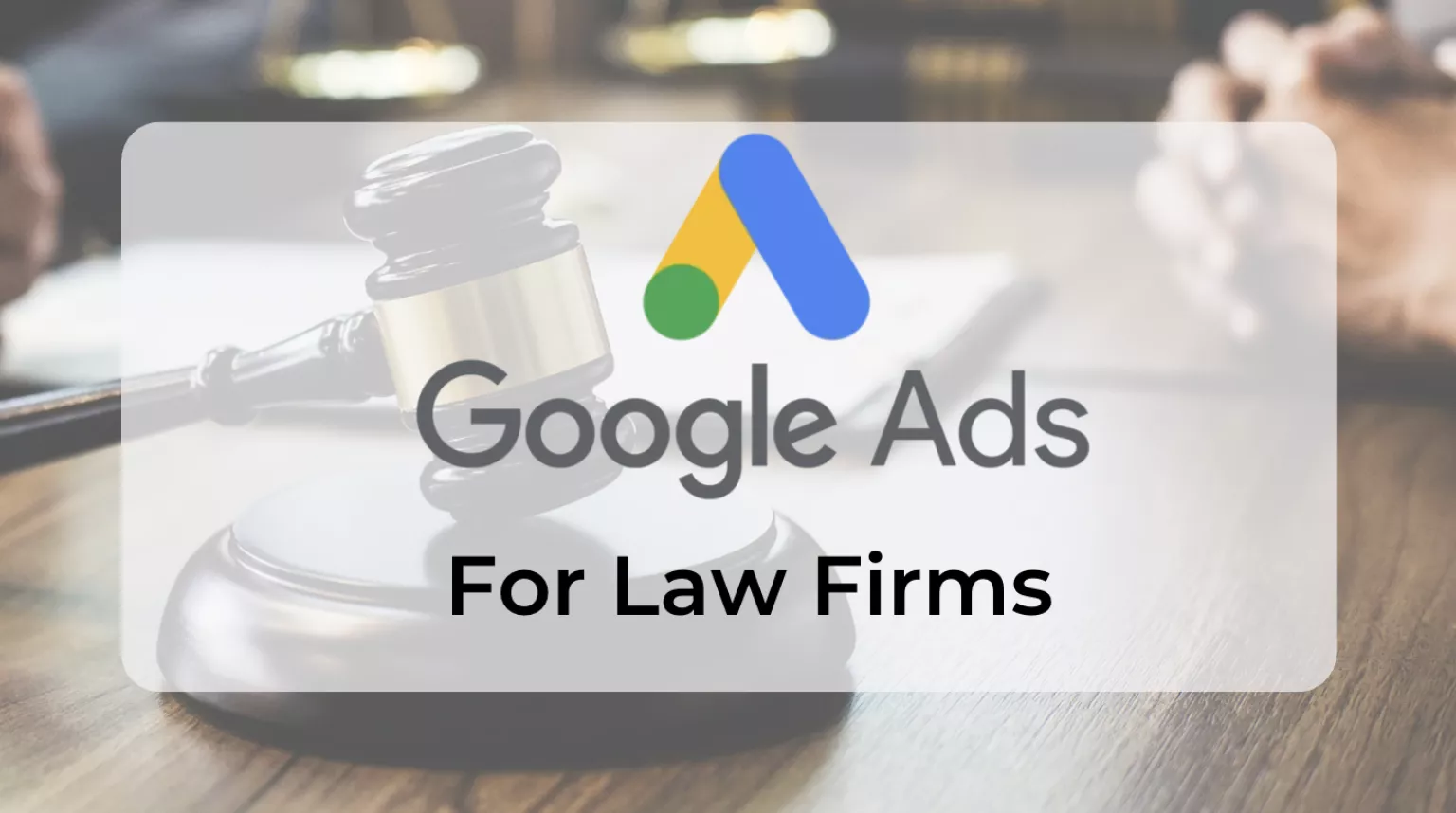
Google Ads For Law Firms - The Complete Guide

by Roy Dovaston
Google Ads for Law Firms: Attract Qualified Leads
Google Ads offers law firms a powerful way to connect with potential clients at the exact moment they need legal services. When someone searches for legal help, they're demonstrating clear intent, there's no question they're in the market for your expertise.
The targeting precision of Google Ads is exceptional, essentially you only pay when prospects search for your specific practice area, allowing you to focus your budget on attracting exactly the right clients.
Many legal firms mistakenly believe Google Ads is too expensive or ineffective, but these perceptions usually stem from fixable issues:
Website conversion problems
Technical setup errors within the Google Ads platform
Poor ad copy that fails to resonate
How Does Google Ads Work?
Google Ads operates on a pay-per-click (PPC) system—you're only charged when someone clicks through to your website.
The platform features multiple advertising formats, including search ads, display ads, and video ads. Google also offers Performance Max campaigns, allowing you to reach potential clients across the entire Google network from a single campaign. For legal practices, search ads typically deliver exceptional results by appearing prominently at the top of search results when prospects look for services matching your keywords.
Google Ads provides sophisticated targeting capabilities to help you reach ideal clients. You can define your audience by location, demographics, interests, and specific search terms relevant to your practice areas.
The key advantage of Google Ads is its ability to connect with potential clients precisely when they're searching for legal services like yours. This timing makes it extraordinarily effective at generating qualified leads compared to other marketing channels, as you're engaging with people who are actively seeking the exact services you provide.
How to Set up a Google Ads Campaign for a Law Firm
Step 1: Choose the Right Campaign Type for Your Law Firm
Most commonly, at this statge you’d choose Leads.
The next choices Google Ads offers include Search, Display, Video, Shopping, and Performance Max. For law firms, Search is usually the best campaign type to start with. Performance Max is heavily promoted as the golden bullet, but in our experience, starting with a Performance Max campaign, at the time of writing is not advised.
Step 2: Define Your Google Ads Campaign Settings
When setting up your campaign, you'll need to establish key parameters including your target geographical areas, daily spending limit, and bid management approach.
Time scheduling is another crucial consideration. Consider whether you want your advertisements to run continuously or only during business hours when staff are available to answer calls. If you're using lead generation forms, continuous delivery may be appropriate, but if you're operating with budget constraints or prefer to qualify prospects via telephone, consider scheduling ads between 8am and 6pm.
Initially, you can allocate equal bids across all keywords. Once your campaign has gathered sufficient data through its learning period, you'll be able to identify your highest-performing keywords and adjust your bidding strategy accordingly, increasing investment in the terms that generate the most valuable leads.
Step 3: Finding Your Legal Keywords
Begin by identifying the optimal search terms for your law firm's Google Ads campaign. Research keywords that potential clients use when seeking legal services in your practice areas.
Focus on terms with clear commercial intent, phrases used by people actively seeking legal representation rather than just information. Consider both broader practice area terms and specific legal issue searches that indicate someone needs immediate assistance.
Include location-specific keywords to target potential clients in your service area. This geographical targeting helps you connect with local prospects searching for nearby legal help.
Analyse your competitors' keywords to identify valuable terms you might have overlooked. Consider search volume, competition levels, and estimated cost-per-click to prioritise keywords that balance visibility with budget efficiency.
Organise your keywords into tightly themed groups based on specific legal services, creating a foundation for highly relevant ad copy and landing pages that improve your quality score and campaign performance.
Refining Your Keyword Strategy
During your keyword research process, it's crucial to identify negative keywords, terms you'll deliberately exclude from your campaign because they fall outside your practice's focus areas.
By adding negative keywords, you prevent your advertisements from appearing in irrelevant searches, which helps preserve your budget for truly qualified prospects. For instance, if your firm specialises in family law, you should exclude terms like "criminal solicitor" or "commercial law" to avoid attracting enquiries you cannot service.
This strategic exclusion improves your campaign's efficiency by ensuring your ads only display to potential clients seeking the specific legal services you provide. Regularly reviewing and expanding your negative keyword list based on search term reports will continually refine your targeting and improve your return on investment.

Step 5: Refine Your Messaging & User Experience
Create compelling, action-driven language that motivates potential clients to engage with your ad.
Rather than using generic phrases like "Contact us for a free consultation," consider more persuasive alternatives such as "Secure your no-obligation case review with our award-winning legal team." Incorporate powerful trust signals such as client testimonials, industry recognitions, or impressive case success statistics to strengthen your credibility.
Ensure perfect alignment between your advertisement and the landing page. When your ad highlights a specific offer, such as complimentary initial advice, your landing page must prominently feature clear instructions on how prospective clients can claim this service. This consistency between promise and delivery significantly improves conversion rates and quality scores.
Step 6: Track Performance and Refine Your Approach
Tracking conversions in Google Ads is absolutely vital - without accurate tracking it’s impossible to optimise your campaigns, so taking the time to understand Google Tag Manager, conversion tracking and Google Analytics (GA4).
Consider extending your tracking capabilities to include offline conversion mechanisms that monitor telephone enquiries and client relationship management data. This comprehensive approach provides valuable insights into which lead sources ultimately convert into paying clients.
After your campaign has completed its initial learning phase, you'll have the opportunity to systematically test and enhance various elements of your advertising strategy, from keyword selection and bid adjustments to landing page content and messaging, creating a continuously improving lead generation system.

